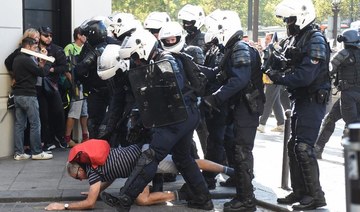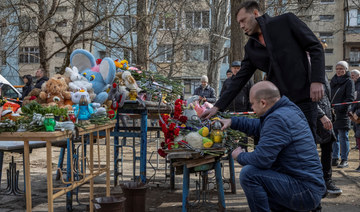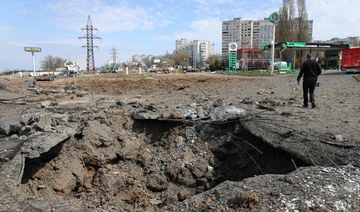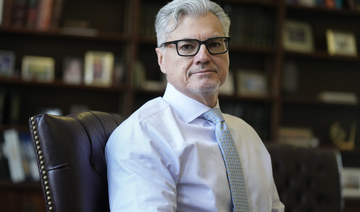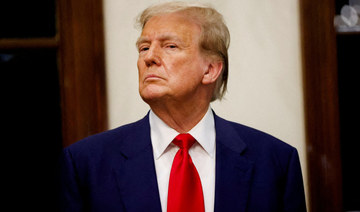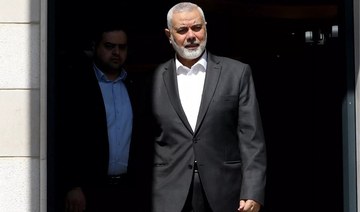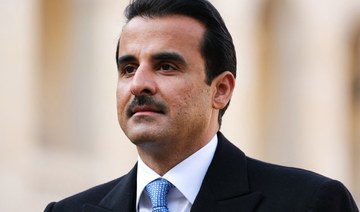PARIS: Thousands of people on Tuesday defied a ban to protest in Paris over the death of a young black man in French police custody in 2016, using slogans that echoed the protest movement raging in the US.
Paris police chief Didier Lallement had refused permission for the rally to go ahead outside a Paris court for protesters calling for justice for Adama Traore, whose death has long been a subject of controversy in France.
Many of the protesters on Tuesday drew inspiration from the protest movement in the United States over the police killing last week of George Floyd, an unarmed black man, brandishing viral slogans in English such as “Black Lives Matter” and “I can’t breathe.”
“Today we are not just talking about the fight of the Traore family. It is the fight for everyone. When we fight for George Floyd, we fight for Adama Traore,” elder sister Assa Traore told the protest.
“What is happening in the United States is an echo of what is happening in France,” she added.
The Traore case has long been a rallying cause against police brutality in France, which young, black men say is often targeted at them.
Following a dispute over an identity check, Traore, 24, was apprehended in a house where he hid after leading police on a 15-minute chase in 2016.
He lost consciousness in their vehicle and died at a nearby police station. He was still handcuffed when paramedics arrived.
One of the three arresting officers told investigators that Traore had been pinned down with their combined bodyweight after his arrest.
Last Friday, French medical experts exonerated the three police officers, dismissing a medical report commissioned by the young man’s family that said he had died of asphyxiation.
It was the third official report to clear the officers.
Adding to the controversy, a new probe commissioned by the Traore family said Tuesday that his death was caused by the arrest technique used by the officers, a source said.
Lallement, meanwhile, wrote a letter to police officers defending their conduct, sympathizing with the “pain” officers must feel “faced with accusations of violence and racism, repeated endlessly by social networks and certain activist groups.”
The Paris police force “is not violent, nor racist: it acts within the framework of the right to liberty for all,” he insisted in an email to the city’s 27,500 law enforcers.
Star French actress Camelia Jordana, who is of Algerian origin, was rebuked last month by the French interior minister for saying people “get massacred” by the police in the Paris suburbs due to the color of their skin.
Several French officers have also been investigated for brutality against members of the public at long-running “yellow vest” anti-government rallies, and more recent anti-pension reform strikes.
Scores of protesters were maimed by rubber bullets or stun grenades, some losing an eye or a hand.
On January 3 this year, a 42-year-old man suffocated to death after being pinned face down to the ground during an arrest in Paris.
Last week, a 14-year-old was badly injured in one eye during a police operation in Bondy, one of Paris’s northern suburbs, sparking protests.
Lallement insisted Tuesday that any officer found to have acted wrongly would be appropriately punished.
“But I will not accept that individual actions throw into question the republican bulwark that we are against delinquency and those who dream of chaos and anarchy,” he wrote.
Thousands in Paris protest death of black man in police custody
https://arab.news/422jf
Thousands in Paris protest death of black man in police custody
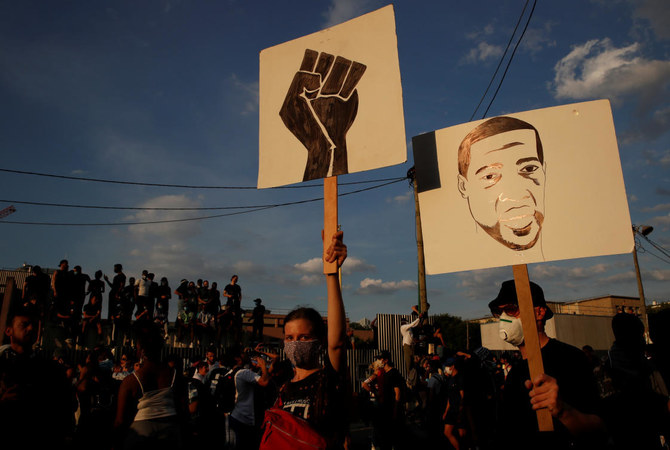
- Paris police chief Didier Lallement had refused permission for the rally to go ahead outside a Paris court for protesters calling for justice for Adama Traore
- Many of the protesters on Tuesday drew inspiration from the protest movement in the United States over the police killing last week of George Floyd
Dutch intelligence sees the wars in Gaza and Ukraine as triggers for terrorist threats
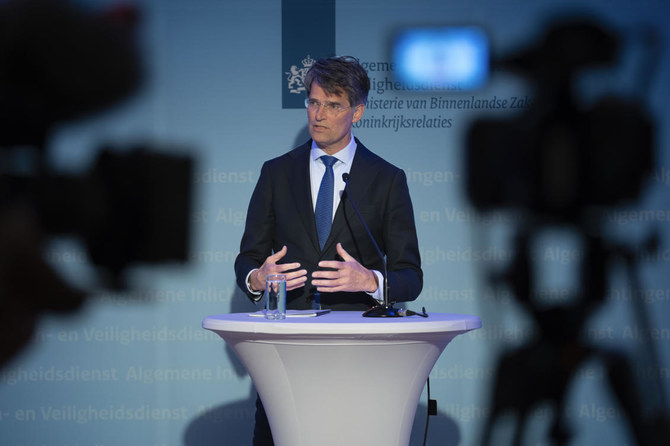
“The terrorist threat is serious at this moment,” the agency’s director-general, Erik Akerboom, told AP
ZOETERMEER, Netherlands: The Dutch national intelligence agency said Tuesday that threats targeting the Netherlands are increasingly connected to worldwide turmoil, including the wars in Gaza and Ukraine.
Although the number of terror attacks across Europe has been down in recent years, the General Intelligence and Security Service in its annual report said the Israel-Hamas war in Gaza and the destruction of a Qur’an outside parliament last year are “trigger events” for extremists.
“The terrorist threat is serious at this moment,” the agency’s director-general, Erik Akerboom, told The Associated Press.
Akerboom said he is particularly concerned about big events, noting that the agency is working closely with French authorities to prevent incidents during the Paris Olympics this summer.
In December, the Dutch counterterrorism agency increased the country’s threat alert to its second-highest level because of concerns about the Daesh group’s Khorasan affiliates, Akerboom said. IS-K, a Central Asian affiliate, was responsible for the attack at a suburban Moscow concert hall that killed at least 133 people in March.
According to the new report, “global jihadism has been the greatest terrorist threat for years in the Netherlands.” Incidents such as the one last April, when an anti-Islam activist tore pages from the Qur’an in front of the Dutch parliament building, put the Netherlands on the map of targets.
About a dozen terror attacks were thwarted by authorities in Europe last year and in four cases, suspects were arrested in the Netherlands, the report said. None of those attacks was focused on the Netherlands, according to Akerboom.
The Dutch also see threats from China, in particular cyberattacks, as a major concern. Akerboom said China is producing more hackers to break into Dutch systems than the Dutch can produce to defend them. The security service has cited China as the biggest threat to the country’s economic security.
Russia also continues to pose a risk to the Netherlands amid Moscow’s full-scale invasion of Ukraine. So-called peace protests in Amsterdam which call for the Dutch to stop sending arms to Ukraine have included demonstrators paid by Russian sources to attend and given prefabricated slogans, the security service has asserted.
The Netherlands is of particular interest to Moscow in part because of the international institutions housed here, including the International Criminal Court. The Hague-based court is investigating crimes in Ukraine and has issued arrest warrants for President Vladimir Putin and other Russians.
Sunak says UK to raise defense spending amid global threats
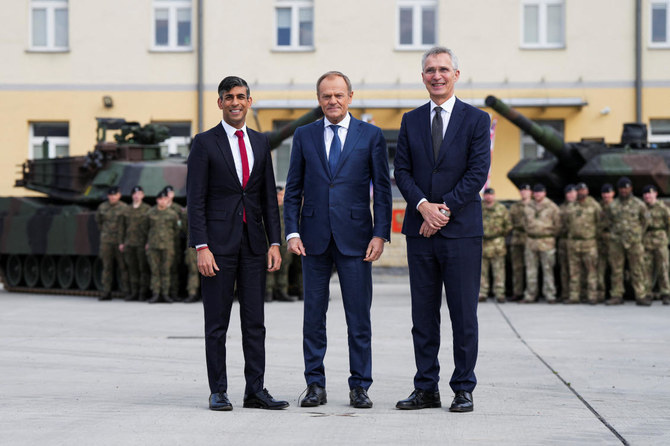
- “In a world that is the most dangerous it has been since the end of the Cold War, we cannot be complacent,” Sunak told reporters
- The increase in spending from 2.3 percent will see the UK become one of the highest spenders on defense in the 32-member defense alliance
WARSAW: Britain will raise defense spending to 2.5 percent of GDP by 2030 in a “most dangerous” world, Prime Minister Rishi Sunak said Tuesday during a visit to Poland.
The commitment came as NATO countries face pressure to raise defense spending in the face of global threats, particularly from Russia.
“In a world that is the most dangerous it has been since the end of the Cold War, we cannot be complacent,” Sunak told reporters in Warsaw, where he held a press conference with NATO Secretary-General Jens Stoltenberg.
The increase in spending from 2.3 percent will see the UK become one of the highest spenders on defense in the 32-member defense alliance after the United States, the British government said.
It means the UK is expected to spend £87 billion on defense in 2030-31, an increase of £23 billion over current levels.
“I believe we must do more to defend our country, our interests, and our values,” Sunak said, announcing “the biggest strengthening of national defense for a generation.”
Western nations are under pressure to boost defense funding following Moscow’s invasion of its neighbor Ukraine as well as the threat of escalation in the Middle East.
EU chief Ursula von der Leyen recently called for a “European awakening on defense and security.”
Brussels is set to come up with more proposals for financing the defense push by a summit of EU leaders in June.
Sunak has also faced calls from his Conservative Party to boost defense spending, with some calling for a level of three percent of GDP.
On Tuesday, Sunak also announced £500 million additional funding for Ukraine’s war effort against Russia.
A Russian strike on Kharkiv’s TV tower is part of an intimidation campaign, Ukraine’s Zelensky says

- Kharkiv region straddles the approximately 1,000-kilometer front line where Ukrainian and Russian forces have been locked in battle for more than two years
- “Four priorities are key: defense of the sky, modern artillery, long-range capacity, and to ensure that packages of American aid arrive as soon as possible,” Zelensky said
KYIV: Ukrainian President Volodymyr Zelensky said a Russian missile strike that smashed a prominent skyline television tower in Kharkiv was part of the Kremlin’s effort to intimidate Ukraine’s second-largest city, which in recent weeks has come under increasingly frequent attack.
The strike sought to “make the terror visible to the whole city and to try to limit Kharkiv’s connection and access to information,” Zelensky said in a Monday evening address.
The northeastern Kharkiv region straddles the approximately 1,000-kilometer (600-mile) front line where Ukrainian and Russian forces have been locked in battle for more than two years since Moscow’s full-scale invasion of Ukraine. The front line has changed little during a war of attrition, focused mostly on artillery, drones and trenches.
Since late March, Russia has stepped up the pressure on Kharkiv, apparently aiming to exploit Ukraine’s shortage of air defense systems. It has pounded the local power grid and hit apartment blocks.
On Monday, a Russian Kh-59 missile struck Kharkiv’s 250-meter (820-foot) -high TV tower, breaking it roughly in half and halting transmissions.
A Washington think tank said Russia may be eyeing a ground assault on Kharkiv.
“The Kremlin is conducting a concerted air and information operation to destroy Kharkiv City, convince Ukrainians to flee, and internally displace millions of Ukrainians ahead of a possible future Russian offensive operation against the city or elsewhere in Ukraine,” the Institute for the Study of War said in an assessment.
The expected arrival in Ukraine in coming weeks of new military aid from its Western partners possibly has prompted Russia to escalate its attacks before the help arrives, the ISW said, adding that trying to capture Kharkiv would be “a significant challenge” for the Kremlin’s forces.
Instead, the Russian military command “may attempt to destroy Kharkiv City with air, missile, and drone strikes and prompt a large-scale internal displacement of Ukrainian civilians,” it said.
The US Senate was returning to Washington on Tuesday to vote on $61 billion in war aid to Ukraine after months of delays. Zelensky said US President Joe Biden assured him the aid would include long-range and artillery capabilities.
“Four priorities are key: defense of the sky, modern artillery, long-range capacity, and to ensure that packages of American aid arrive as soon as possible,” Zelensky said.
Also Tuesday, Britain pledged 500 million pounds ($620 million, 580 million euros) in new military supplies for Ukraine, including 400 vehicles, 60 boats, 1,600 munitions and 4 million rounds of ammunition.
The shipment will also include British Storm Shadow long-range missiles, which have a range of about 150 miles (240 kilometers) and have proven effective at hitting Russian targets, the British government said.
British Prime Minister Rishi Sunak spoke with Zelensky on Tuesday morning to confirm the new assistance. He was due to announce the aid later Tuesday during a visit to Warsaw where he was meeting with Polish Prime Minister Donald Tusk and NATO Secretary General Jens Stoltenberg.
Less cheering news came from the European Union, however. EU countries that have Patriot air defense systems gave no clear sign Monday that they might be willing to send them to Ukraine, which is desperately seeking at least seven of the missile batteries.
Ukraine’s army is also heavily outnumbered in the fight, and expanding the country’s mobilization has been a delicate issue.
Ukrainian Foreign Minister Dmytro Kuleba on Tuesday signaled that authorities plan to clamp down on young men of conscription age who have moved abroad, with details of the specific measures to be made public soon.
“Staying abroad does not relieve a citizen of his or her duties to the homeland,” Kuleba said on the social media platform X.
Meanwhile, Russia launched 16 Shahed drones and two Iskander-M ballistic missiles over Ukraine’s southern and central regions, the Ukrainian air force said Tuesday morning. It said all but one of the drones were intercepted.
In Odesa, an overnight attack injured nine people, regional Gov. Oleh Kiper said. Among those injured were two infants and two children aged nine and 12, Kiper said. City mayor Hennadii Trukhanov said 58 apartments in 22 buildings were damaged.
In other developments:
A Russian missile strike near Dnipro, Ukraine’s fourth-largest city, injured four people who were admitted to hospital, regional Gov. Serhii Lysak said.
Russian forces dropped a guided aerial bomb in Kostiantynivka, a city in the eastern Donetsk region, injuring five people who were riding in a car, police said. Two of them were in critical conditions.
Trump to meet with senior Japanese official after court session Tuesday in hush money trial
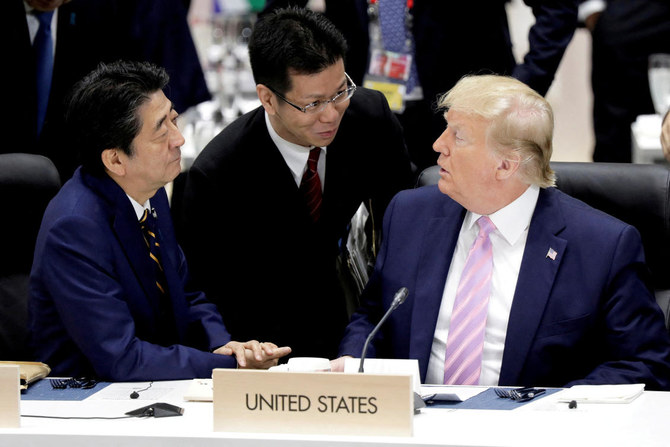
- “Leaders from around the world know that with President Trump we had a safer, more peaceful world,” said Trump spokesperson Brian Hughes
- Trump met last week with Polish President Andrzej Duda at Trump Tower and also met recently with British Foreign Secretary David Cameron and Hungarian Prime Minister Viktor Orbán
WASHINGTON: Former President Donald Trump is meeting with another foreign leader while he’s in New York for his criminal hush money trial.
The presumptive GOP nominee will host former Japanese Prime Minister Taro Aso at Trump Tower Tuesday, according to two people familiar with the plans who spoke on condition of anonymity because they had not been formally announced.
Aso is just the latest foreign leader to spend time with Trump in recent weeks as US allies prepare for the possibility that he could win back the White House this November.
“Leaders from around the world know that with President Trump we had a safer, more peaceful world,” said Trump spokesperson Brian Hughes in a statement. “Meetings and calls from world leaders reflect the recognition of what we already know here at home. Joe Biden is weak, and when President Trump is sworn in as the 47th President of the United States, the world will be more secure and America will be more prosperous.”
Trump met last week with Polish President Andrzej Duda at Trump Tower and also met recently with British Foreign Secretary David Cameron and Hungarian Prime Minister Viktor Orbán.
Trump was close with Shinzo Abe, the former Japanese prime minister who was assassinated in 2022. Aso is vice president of the Japanese Liberal Democratic Party and also served as deputy prime minister and finance minister under Abe.
Trump has threatened to impose broad new tariffs if he wins a second term.
Early Tuesday morning, he complained about the US dollar reaching a new high against the Japanese yen, calling it “a total disaster for the United States.”
“When I was President, I spent a good deal of time telling Japan and China, in particular, you can’t do that,” he wrote on his Truth Social platform. “It sounds good to stupid people, but it is a disaster for our manufacturers and others.”
The US dollar is trading at above 150 yen recently, up from 130-yen mark a year ago, which has made it more costly for Japan to import goods but has boosted exports.
President Joe Biden hosted current Japanese Prime Minister Fumio Kishida at the White House for talks and a state dinner earlier this month. During the visit, the leaders announced plans to upgrade US-Japan military relations, with both sides looking to tighten cooperation amid concerns about North Korea’s nuclear program and China’s increasing military assertiveness in the Pacific.
Bangladesh, Qatar sign 10 cooperation deals during emir’s first Dhaka trip
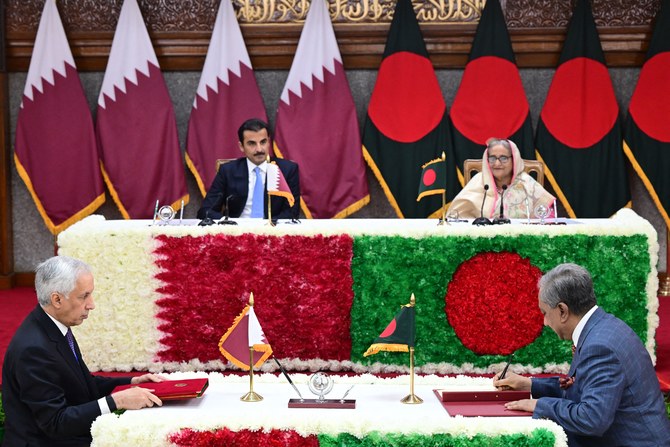
- Agreements cover investment, maritime transport and establishment of joint business council
- Bangladeshi president invited Qatar’s emir to invest in the country’s special economic zones
DHAKA: Bangladesh and Qatar signed 10 cooperation agreements on Tuesday as the Gulf state’s Emir Sheikh Tamim bin Hamad Al-Thani made his first official visit to Dhaka.
Prime Minister Sheikh Hasina and Sheikh Tamim witnessed the signing ceremony, which covered deals on investment, maritime transport, taxation, legal affairs and the establishment of a Bangladesh-Qatar joint business council.
The two countries also signed several memoranda of understanding, including on diplomatic training, education, labor, youth and sports, as well as port management cooperation.
Sheikh Tamim then held a meeting with President Mohammed Shahabuddin as part of his visit to Bangladesh, which is the second stop in the emir’s Asia tour that began in the Philippines on Sunday.
During their talks, Shahabuddin invited Qatar to invest in Bangladesh’s special economic zones.
“Bangladesh will welcome investments in various sectors including in state-led food supply chains from production to consumption such as agro-production and processing, food packaging, smart agriculture and fertilizer production,” Shahabuddin’s press secretary Joynal Abedin told reporters after the meeting.
“Qatar investors can get massive incentives and support in sectors like petrochemicals, energy, machineries, information technology, electronics, ceramics, agri-business, and food processing in Bangladesh.”
Shahabuddin also urged Sheikh Tamim to recruit more skilled workers from Bangladesh during their talks, Abedin said.
Qatar is currently the largest supplier of liquefied natural gas to Bangladesh. Earlier this year, the emirate signed a 15-year agreement with the US-based Excelerate Energy to supply 1 million metric tons per year of LNG to Bangladesh starting from January 2026.
The Gulf state is also home to about 400,000 Bangladeshis who live and work there, as it is one of the preferred destinations for migrant workers from the South Asian country.



